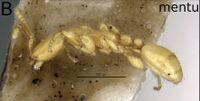Aenictus mentu
| Aenictus mentu | |
|---|---|

| |
| Scientific classification | |
| Kingdom: | Animalia |
| Phylum: | Arthropoda |
| Class: | Insecta |
| Order: | Hymenoptera |
| Family: | Formicidae |
| Subfamily: | Dorylinae |
| Genus: | Aenictus |
| Species group: | rixator |
| Species: | A. mentu |
| Binomial name | |
| Aenictus mentu Weber, 1942 | |
This species is currently known only from the type series, collected in South Sudan by Neal Weber in 1939.
Identification
Gómez (2022) - A member of the Aenictus rixator species group.
Keys including this Species
Distribution
Latitudinal Distribution Pattern
Latitudinal Range: 4.112954° to 4.112954°.
| North Temperate |
North Subtropical |
Tropical | South Subtropical |
South Temperate |
- Source: AntMaps
Distribution based on Regional Taxon Lists
Afrotropical Region: Sudan (type locality).
Distribution based on AntMaps
Distribution based on AntWeb specimens
Check data from AntWeb
Countries Occupied
| Number of countries occupied by this species based on AntWiki Regional Taxon Lists. In general, fewer countries occupied indicates a narrower range, while more countries indicates a more widespread species. |

|
Estimated Abundance
| Relative abundance based on number of AntMaps records per species (this species within the purple bar). Fewer records (to the left) indicates a less abundant/encountered species while more records (to the right) indicates more abundant/encountered species. |

|
Biology
Known only from the worker caste.
Castes
Known from the worker caste. Table of castes known for all Afrotropical Aenictus species.
Nomenclature
The following information is derived from Barry Bolton's Online Catalogue of the Ants of the World.
- mentu. Aenictus mentu Weber, 1942a: 40, fig. 2 (w.) SOUTH SUDAN.
- Type-material: syntype workers (number not stated, “one colony”).
- Type-locality: South Sudan (“Anglo-Egyptian Sudan”): Imatong Mts, 4.viii.1939, ca 4200 ft. No. 1436 (N.A. Weber).
- Type-depository: MCZC.
- Status as species: Weber, 1943c: 292; Bolton, 1995b: 60; Gómez, 2022: 45.
- Distribution: South Sudan.
Type Material
- Syntype, SOUTH SUDAN: Equatoria Region, Imatong Mountains (Neal A. Weber) 24 Jul- 5 Aug. 1939. (1w) [MCZC:ENT:26131] MCZC [Material seen on web by Gomez, 2022].
Taxonomic Notes
Gomez (2022): The type material is located at the MCZC, but it wasn’t available for examination for this study. Also, no other specimens were found in any of the major museum collections that provided access or material loans. I have provisionally placed this species in the same group as Aenictus rixator due to measurements from the type images (HW~0.40, CI~90), habitus, clypeal shape and mandibles. Based on paucity of material and the limited image quality, presently I have to refrain from offering a more accurate diagnosis or description until the types can be analyzed in detail.
Description
References
- Gomez, K. 2022. A revision of the Afrotropical species of the Dorylinae ant genus Aenictus (Hymenoptera: Formicidae) based on the worker caste. Belgian Journal of Entomology 124: 1–86 (doi:10.5281/zenodo.5898821).
- Weber, N. A. 1942b. New doryline, cerapachyine and ponerine ants from the Imatong Mountains, Anglo-Egyptian Sudan. Proc. Entomol. Soc. Wash. 44: 40-49 (page 40, fig. 2 worker described)
References based on Global Ant Biodiversity Informatics
- Borowiec M. L. 2016. Generic revision of the ant subfamily Dorylinae (Hymenoptera, Formicidae). ZooKeys 608: 1–280.
- Weber N. A. 1942. New doryline, cerapachyine and ponerine ants from the Imatong Mountains, Anglo-Egyptian Sudan. Proc. Entomol. Soc. Wash. 44: 40-49.
- Weber N. A. 1943. The ants of the Imatong Mountains, Anglo-Egyptian Sudan. Bulletin of the Museum of Comparative Zoology 93: 263-389.

